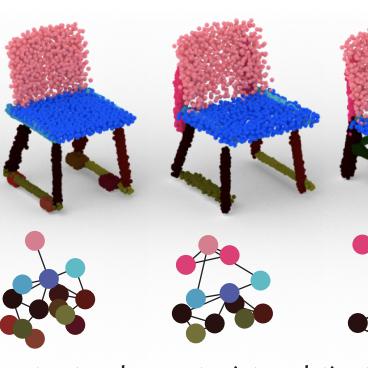Search Results for author: Jihoon Kim
Found 11 papers, 5 papers with code
Deep Generative Design for Mass Production
no code implementations • 16 Mar 2024 • Jihoon Kim, Yongmin Kwon, Namwoo Kang
Generative Design (GD) has evolved as a transformative design approach, employing advanced algorithms and AI to create diverse and innovative solutions beyond traditional constraints.
Deep Generative Model-based Synthesis of Four-bar Linkage Mechanisms with Target Conditions
1 code implementation • 22 Feb 2024 • Sumin Lee, Jihoon Kim, Namwoo Kang
The proposed model is based on a conditional generative adversarial network (cGAN) with modifications for mechanism synthesis, which is trained to learn the relationship between the requirements of a mechanism with respect to linkage lengths.
X-SNS: Cross-Lingual Transfer Prediction through Sub-Network Similarity
no code implementations • 26 Oct 2023 • Taejun Yun, Jinhyeon Kim, Deokyeong Kang, Seong Hoon Lim, Jihoon Kim, Taeuk Kim
Cross-lingual transfer (XLT) is an emergent ability of multilingual language models that preserves their performance on a task to a significant extent when evaluated in languages that were not included in the fine-tuning process.
DeepRepViz: Identifying Confounders in Deep Learning Model Predictions
no code implementations • 27 Sep 2023 • Roshan Prakash Rane, Jihoon Kim, Arjun Umesha, Didem Stark, Marc-André Schulz, Kerstin Ritter
In conclusion, the DeepRepViz framework provides a systematic approach to test for potential confounders such as age, sex, and imaging artifacts and improves the transparency of DL models for neuroimaging studies.
Performance Comparison of Design Optimization and Deep Learning-based Inverse Design
no code implementations • 23 Aug 2023 • Minyoung Jwa, Jihoon Kim, Seungyeon Shin, Ah-hyeon Jin, Dongju Shin, Namwoo Kang
Surrogate model-based optimization has been increasingly used in the field of engineering design.
BubbleML: A Multi-Physics Dataset and Benchmarks for Machine Learning
4 code implementations • 27 Jul 2023 • Sheikh Md Shakeel Hassan, Arthur Feeney, Akash Dhruv, Jihoon Kim, Youngjoon Suh, Jaiyoung Ryu, Yoonjin Won, Aparna Chandramowlishwaran
In the field of phase change phenomena, the lack of accessible and diverse datasets suitable for machine learning (ML) training poses a significant challenge.
Learning Joint Representation of Human Motion and Language
no code implementations • 27 Oct 2022 • Jihoon Kim, Youngjae Yu, Seungyoun Shin, Taehyun Byun, Sungjoon Choi
In this work, we present MoLang (a Motion-Language connecting model) for learning joint representation of human motion and language, leveraging both unpaired and paired datasets of motion and language modalities.
FLAME: Free-form Language-based Motion Synthesis & Editing
1 code implementation • 1 Sep 2022 • Jihoon Kim, Jiseob Kim, Sungjoon Choi
FLAME involves a new transformer-based architecture we devise to better handle motion data, which is found to be crucial to manage variable-length motions and well attend to free-form text.
Simulation-guided Beam Search for Neural Combinatorial Optimization
1 code implementation • 13 Jul 2022 • Jinho Choo, Yeong-Dae Kwon, Jihoon Kim, Jeongwoo Jae, André Hottung, Kevin Tierney, Youngjune Gwon
Neural approaches for combinatorial optimization (CO) equip a learning mechanism to discover powerful heuristics for solving complex real-world problems.
Conditional Motion In-betweening
1 code implementation • 9 Feb 2022 • Jihoon Kim, Taehyun Byun, Seungyoun Shin, Jungdam Won, Sungjoon Choi
Motion in-betweening (MIB) is a process of generating intermediate skeletal movement between the given start and target poses while preserving the naturalness of the motion, such as periodic footstep motion while walking.
Summary Level Training of Sentence Rewriting for Abstractive Summarization
no code implementations • WS 2019 • Sanghwan Bae, Taeuk Kim, Jihoon Kim, Sang-goo Lee
As an attempt to combine extractive and abstractive summarization, Sentence Rewriting models adopt the strategy of extracting salient sentences from a document first and then paraphrasing the selected ones to generate a summary.
 Ranked #5 on
Extractive Text Summarization
on CNN / Daily Mail
Ranked #5 on
Extractive Text Summarization
on CNN / Daily Mail
 Abstractive Text Summarization
Abstractive Text Summarization
 Extractive Text Summarization
+3
Extractive Text Summarization
+3




